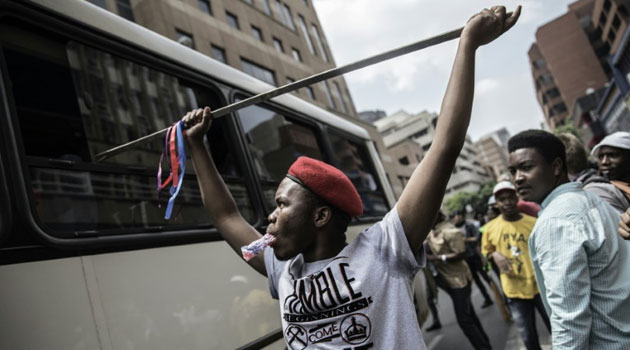JOHANNESBURG, Oct 22 – Thousands of students demonstrated outside the headquarters of the ruling ANC in Johannesburg on Thursday in rolling protests that have become a focus for youth frustration in South Africa.
Campus unrest erupted again as security guards pepper-sprayed students at the University of Johannesburg, an AFP photographer witnessed, in one of several flashpoints around the country with rallies also in Cape Town, Pretoria and several provincial cities.
Demonstrations have built over the last week against university fee hikes, with hundreds of students on Wednesday storming through the gates outside parliament in Cape Town.
Police used stun grenades to protect the national assembly building as lawmakers inside were ordered to stay in their offices.
“We are born free from apartheid, but there is corruption in the government,” Gabriella Blumberg, a 22-year-old student at the University of the Witswatersrand (Wits) in Johannesburg, told AFP.
“The ANC (African National Congress) leadership during apartheid didn’t envision how the ANC would be acting now.”
Derrick Swartz, vice chancellor at Nelson Mandela Metropolitan University in Port Elizabeth, where police fired bullets at protesters on Wednesday, said the country’s education system needed radical reform.
“I fully recognise the hardship faced by… students coming from poor backgrounds, in paying university fees,” he said.
“Higher education is grossly underfunded.”
The government announced that President Jacob Zuma would meet student leaders and university officials on Friday in Pretoria “to discuss the stalemate with regards to university fee increases”.
“It is important that we work together to find solutions,” Zuma said in a statement.
“Nobody disagrees with the message that students from poor households are facing financial difficulties and possible exclusion.”
Riot police again launched stun grenades at a protest in Cape Town, while violent clashes also broke out at University of Fort Hare in Eastern Cape province.
– ‘Making history’? –
University activism has been increasing this year as students vent their anger over the limited racial transformation in education since racist white-minority rule ended with Nelson Mandela’s election in 1994.
Many students says higher fees — which could rise by 10 percent a year — will further prevent poorer black youths gaining university education.
Student leaders complain that discrimination and racism are still rife on university campuses.
At Stellenbosch University outside Cape Town, students have been lobbying for weeks for more classes to be taught in English rather than Afrikaans, the language of the former apartheid regime.
Protests over education have a strong resonance in South Africa, where the Soweto uprisings in 1976 against Afrikaans-language lessons were brutally suppressed by police.
“The generation before us felt like we were a lost generation, but now we’re standing up for something that should be a right,” said Potlako Ngoasheng, a 19-year-old student at Wits.
“I feel we are making history — it’s 1976 reloaded.”
Human rights organisation Amnesty International has called for the police to use restraint.
“We are alarmed by reports of police officers using tear gas and rubber bullets against peaceful protesters,” Amnesty’s southern Africa director Deprose Muchena said.
“Students have a right to express their grievances peacefully and police must respect this right.”
About 30 protesters arrested in Cape Town on Wednesday were released under caution. They face charges of public violence, illegal gathering and trespassing.
Earlier this year, students at the University of Cape Town led a high-profile and successful campaign for the removal of a statue of British imperialist Cecil John Rhodes from the campus.















































